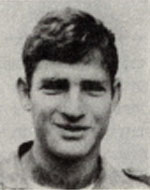Ezra, son of Hannah and son of-Zion, was born on 29.11.1950 in Kibbutz Lehavot Habashan, a bright, fair-haired young man who had a fine and vivid imagination. In his small hands, he painted large and colorful paintings and built magnificent palaces from cubes, he told stories of imagination and reality, and shared his experiences with his little friends and family, and he loved the life of the kindergarten and the school. Various activities for the members of his group and their center for the joint activity of a creative work, with inventions and a great deal of originality. Zuri, the “Einot Hayarden” in Amir, was well integrated into his studies and social activities, like many young people, he did not pay attention to externalities and was unable to live according to laws and conventions, He tried to convince him to the best of his ability, but when it did not help, he did as he pleased and did not give in. According to his teacher, he did the things that seemed important to him and which he did with rare devotion and perseverance. He had great concentration and was not deterred by any effort for them. As a child, Ezra liked to sing and listen to music, and in adolescence he discovered a conspicuous musical talent. He played the guitar with great skill and even composed. Many Arabs spent playing the music that filled the soul. The music, Ezra and the guitar were a complete and inseparable thing. A world in itself. Ezra also had hobbies. In addition to playing and painting handicrafts, he toured all parts of the country and practiced sports – excelled at running among his peers. During this period he was a counselor for a group of children in his kibbutz and later served as a counselor at the Hashomer Hatzair youth movement in Kiryat Shmona. He dealt with it with all his Lev, wanting to improve the lives of the inhabitants of the development town. After school he worked under the guidance of the Hashomer Hatzair branch in Nahariya, where he was a group leader and a head of a nest. It was a very Simcha year for him. Ezra had a great deal of physical strength, but was a little ashamed of it. He had the mental ability to overcome physical difficulties. His friends said that on difficult journeys, he would imagine that it was only a Yaffa trip, and he managed to overcome it. A prominent line in his personality is the love of man, the understanding of his thoughts and behavior. His attitude toward human beings was natural, unmediated and warm because he loved life, loved nature, the girls and the family. In this love of life he also helped his friends, who sought his closeness in their distress. Even when Ezra was serious, thoughtful and even gloomy, his blue eyes were optimistic and warm. Because of this love of life he wanted to study medicine and psychology, because these professions come to the aid of man. Ezra was drafted into the IDF in early 1970. He was assigned to a reconnaissance unit, and after completing basic training for combat officers, he was assigned to the medical corps and served as combat medic. Ezra did not like the army; Discipline, organization and order against his personality. At first his commanders demanded that he be a soldier like all the soldiers, but in the end they accepted him as he was. Although he was usually disorderly, his medic’s equipment was wonderfully organized and the work he loved knew exactly. In time of stress he would soothe the people, smiling and encouraging. The wounded were expert and dedicated, and at the same time he reassured them that nothing had happened to them. When he was on leave, he was very Simcha to be a citizen, easily integrated into the work life of his kibbutz and also helped in cultural activities. He had many plans, including a program to travel abroad and study, when the Yom Kippur War broke outYom Kippur, was still on leave. On the eve of Yom Kippur he was urgently called to his unit on the Golan Heights and took part in the battles. When our forces broke through the “Hadar” to one of the outposts, security personnel were injured. Ezra organized the concentration point for the wounded, treated them with cool composure and encouraged their spirits. When Syrian planes appeared at them, he leaned over one of the wounded to protect him from the aircraft. On this occasion, he received a commendation from the Chief of Staff “for the courage, coolness and brotherhood of fighters.” On the 22nd of Tishrei 5740 (22.10.1973), during the second battle on the Hermon, Ezra was hit by a sniper’s bullet and killed. He was brought to rest in the cemetery in Lehavot Habashan, leaving behind his parents and two brothers, and after his fall he was promoted to the rank of sergeant.
